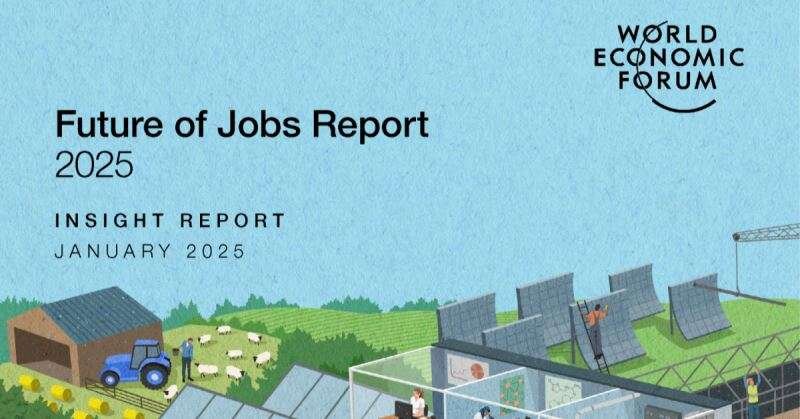WEF’s Future of Jobs Report 2025
Recevoir tous les offres d'emploi
In the next 5 years, nearly 25% of all jobs will undergo radical transformation. Are we prepared?
WEF’s Future of Jobs Report 2025 presents evidence of unprecedented workplace transformation ahead. The scale is significant: 22% of current jobs will transform by 2030, with 170M new roles emerging and 92M being displaced. This isn’t merely change – it’s a fundamental restructuring of how we work.
Three critical forces are shaping this transformation:
-
-
- 1) AI’s Transformative Impact:
- The data is clear: 86% of organizations anticipate AI reshaping their operations. Since 2022, AI investment has increased eightfold, driving demand for AI specialists, data analysts, and cybersecurity experts. Yet the most intriguing shift lies in task distribution: human-performed tasks will decrease from 47% to 33% by 2030. This raises a crucial strategic question: How do we architect human-AI collaboration to enhance rather than replace human capability?
- 2) Sustainability as a Strategic Driver:
- With 47% of organizations intensifying carbon reduction efforts and 41% adapting to climate challenges, this expertise has become a critical business capability. However, a significant skills gap persists – while green job postings increased 22% in 2023, only 12% of the workforce possesses these capabilities. This disconnect requires immediate strategic attention.
- 3) Supply Chain reEvolution:
- Global trade patterns are being reshaped by geopolitical fragmentation, with 1/3 of organizations citing this as a primary driver of transformation. Simultaneously, digital transformation is revolutionizing SCM through predictive modeling and carbon tracking. The projected creation of 11M jobs (offset by 9M displaced) underscores the urgency of strategic workforce planning.
- 1) AI’s Transformative Impact:
-
The data points to a clear conclusion: skill gaps represent a primary barrier to business transformation, cited by 63% of organizations. By 2030, 59% of workers will require significant reskilling, yet current pace suggest 11% will remain untrained. More concerning: 1.2B young people entering emerging economy workforces will compete for just 420M new positions.
Where should you focus?
1. Design AI implementation strategies that prioritize augmentation over replacement
2. Develop comprehensive green skilling programs aligned with business objectives
3. Engineer resilient, inclusive supply chains that create value across all tiers
4. Implement equitable workforce development strategies that address demographic shifts











